After zealots overran egalitarian prayers, PM stressed non-Orthodox Jews’ right to worship at site, but that will only be proven if cops quash such interruptions on Saturday night
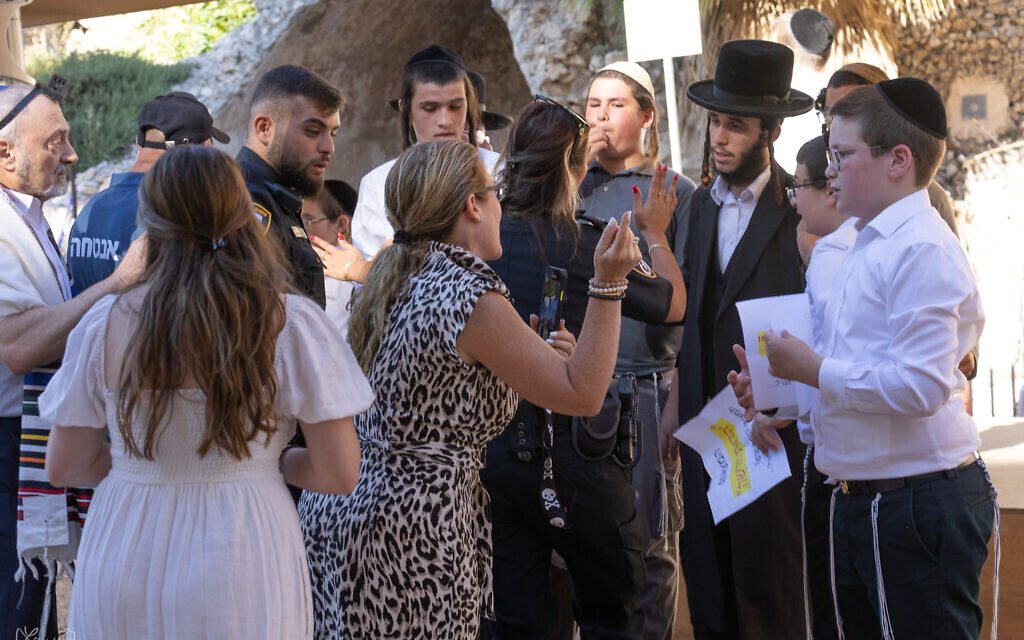
On Saturday night, Jews will gather at the egalitarian section of the Western Wall to read the Book of Lamentations, describing in horrid detail the destruction of the Jewish temple some 2,600 years ago — or at least they hope to.
Last year’s Tisha B’Av day of mourning, Orthodox extremists overran the egalitarian section, also known as Ezrat Yisrael or Robinson’s Arch, during the reading of Lamentations, known in Hebrew as Eicha. This was considered particularly heinous as Tisha B’Av commemorates the destruction of the two Jewish temples, the second of which is traditionally believed to have been brought down due to “baseless hatred” between Jews at the time. Comparisons between the “baseless hatred” that led to the temple destruction and the “baseless hatred” on display that night abounded.
Just over a month ago, a similar group of hardline Orthodox youths did it again, disrupting bar and bat mitzvah ceremonies being held by American families at Ezrat Yisrael, tearing up prayer books, calling the worshippers “Nazis” and “Christians,” and using whistles to drown out the services. Police officers who were at the scene largely refrained from intervening, only acting when there was an immediate threat of violence but doing nothing to halt the disruptions.
In between, there have been multiple cases of Orthodox activists setting up a gender-segregating barrier, or a mechitza, at the egalitarian section as a form of protest against the non-Orthodox prayer.
There was only muted criticism in Israel following the events of last Tisha B’Av and June 30. But after the latter — largely due to pressure from leading American and international Jewish organizations — Israeli politicians, namely Prime Minister Yair Lapid, issued firm denunciations of the disruptions and violent protests.
“I am against all violence at the Western Wall against people who want to pray as their faith allows them. This cannot continue,” Lapid said after the incident in late June.
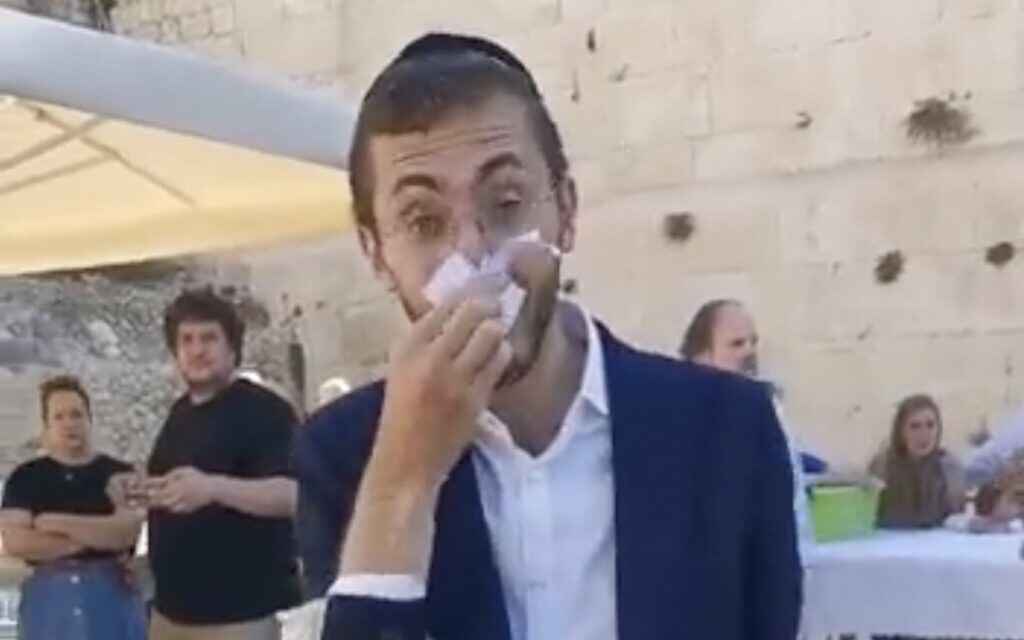
The prime minister also called one of the bar mitzvah boys whose ceremony was overrun, telling him that what happened “did not represent the State of Israel, the people of Israel, or the government of Israel,” according to a source who was on the line.
During the phone call, Lapid called the violent protests “outrageous” and said that every Jew should be able to pray as they see fit, the source said, speaking to The Times of Israel on condition of anonymity.
On Saturday night, it will be clear if Lapid’s remarks were a true intention to ensure the rights of non-Orthodox Jews to pray undisturbed at the Western Wall’s egalitarian section or simply lip service.
“The prime minister and the government of Israel have a responsibility to maintain safety for worshippers in Israel, including at the Kotel,” Rabbi Jacob Blumenthal, the head of the United Synagogue of Conservative Judaism, told The Times of Israel recently.
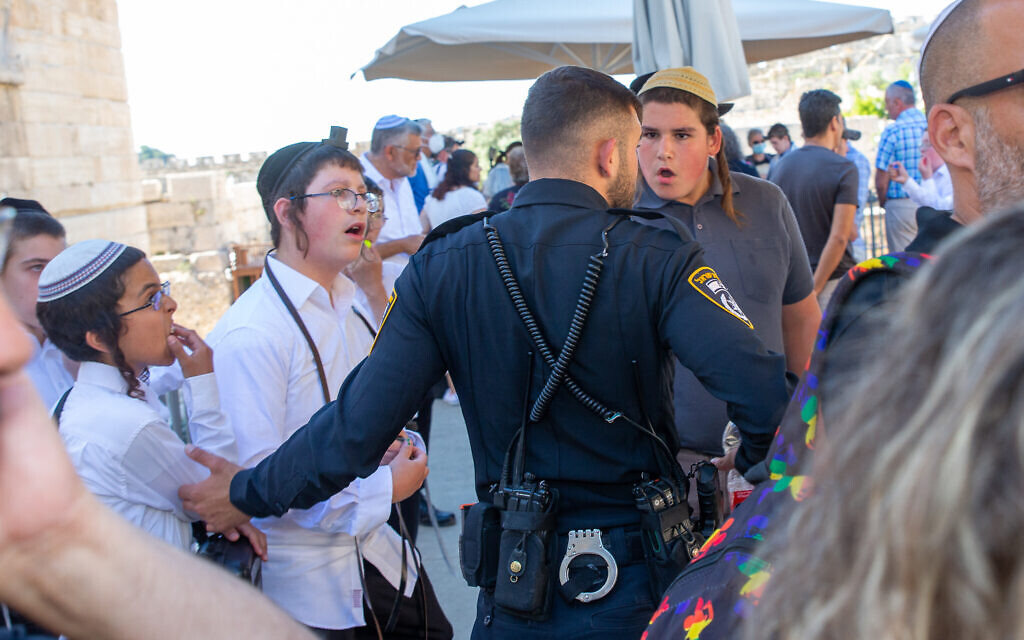
“This is a time for courageous leadership,” he said.
One of the key areas of criticism following the events of June 30 was the inaction by police, who allowed the mostly ultra-Orthodox, or Haredi, protesters to disrupt the prayer services unabated.
There are laws on the books in Israel that make it a crime to insult other people’s religion — which the protesters ostensibly did by tearing up prayer books and calling the worshippers Christians — or to “deliberately disturb a group of people who legally gathered for religious worship,” which the demonstrators also emphatically did.
These laws are not necessarily applicable in the aforementioned cases since non-Orthodox prayer is generally not recognized as legitimate by the Israeli government and it thus is not protected by these laws, argued Yizhar Hess, a former of the Masorti Movement in Israel and current vice-chairman of the World Zionist Organization.
Instead, this type of mostly nonviolent demonstration by Haredi extremists falls into a legal gray area where the police could potentially act but could also justify the situation as a legal protest. As there is a lack of clear guidance and political will to crack down on these kinds of interruptions, police tend to opt for the latter option.
“On the one hand, the current guidelines do not allow the police to act. So you can go in there and do whatever you are permitted to do in a public space. But on the other hand, we know that when the police want to act, they know how to act. Preventing a public disturbance is something that can be stopped without the need for special guidelines,” Hess told The Times of Israel last month.
In somewhat of an effort to address this, the Prime Minister’s Office issued a letter to the Company for the Development and Renovation of the Jewish Quarter, which is officially responsible for managing the Robinson’s Arch section, “clarifying” that it is forbidden to bring a mechitza into the area and that it is ultimately the responsibility of police to enforce this ban.
Though this would prevent the type of “takeover” protests seen in the past, where activists attempt to turn the area into an Orthodox prayer space, it falls far, far short of instructing the police to protect egalitarian prayer and arrest those who seek to disrupt it. The PMO’s directive would have done nothing to prevent the disruptions seen at the bar and bat mitzvah’s in June, for instance.
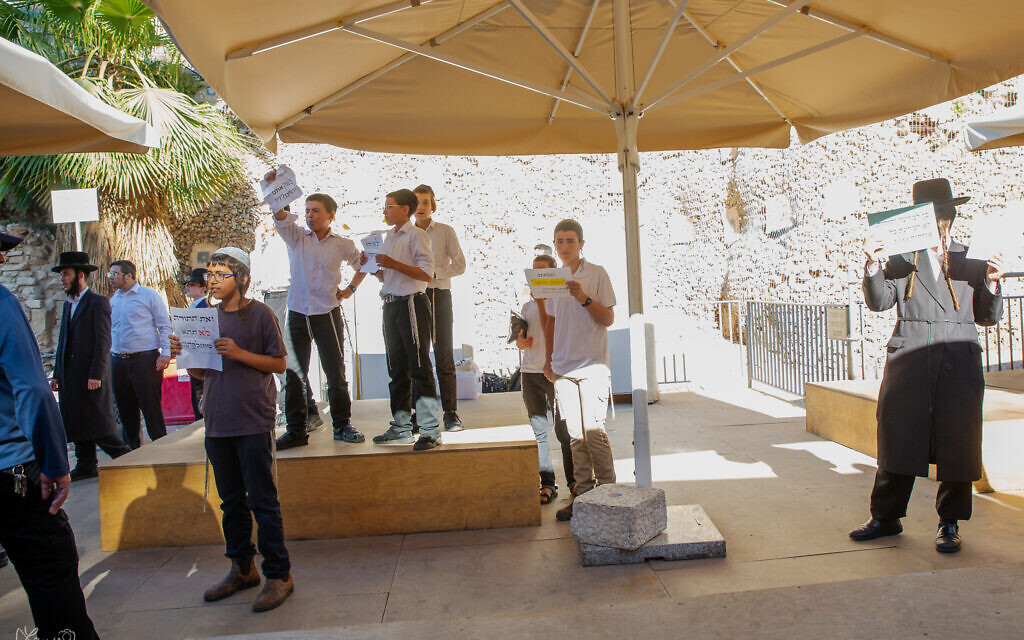
“We are grateful that the Prime Minister’s Office issued a letter reiterating the banning of mechitzot from the section and indicating that the police have jurisdiction should that occur. But I would say we need better definitions of other behavior that is prohibited and where the police can intervene,” Blumenthal said.
“We are hopeful that the… government will clarify that and make sure that we can enforce a respectful prayer service at the Kotel,” he said, using the Hebrew term for the Western Wall.
The mechitza ban is also far from definitive, as could be seen last week when a top police officer at the Western Wall was asked about the matter by Orthodox activists.
“There’s no law about this. You can claim ‘freedom of religion,’ they can claim ‘freedom of religion.’ Everyone’s got their freedom,” the officer was filmed telling them.
There are also no indications that police have changed their interpretations of disruption of non-Orthodox prayer, seeing it as a criminal act rather than an act of legal protest.
Last month, cabinet secretary Shalom Shlomo met with the heads of the Reform and Conservative movements in Israel and informed them that police enforcement policies on the matter would remain the same.
“We were shocked to hear that the Israel Police was abdicating its responsibility to protect the peace of worshippers in… Ezrat Yisrael,” a spokesperson for the Reform movement said.
It’s not just the police
Blumenthal stressed that security arrangements at the egalitarian section, while significant, are only a small part of the larger fight for non-Orthodox representation at the Western Wall.
“We don’t want to only focus on security. All of this is part of a larger discussion about the implementation of the Kotel agreement. That the agreement hasn’t been implemented allows this to occur,” Blumenthal said.
He was referring to a deal generally referred to as the Western Wall compromise, which would have — among other things — granted official legitimacy to non-Orthodox prayer at the egalitarian section and given non-Orthodox denominations a role in the management of the Western Wall.
The government agreed to implement the deal in 2016, but at the last minute due to pressure from ultra-Orthodox parties, then-prime minister Benjamin Netanyahu halted the move and it has remained frozen ever since, despite current Prime Minister Lapid’s public support for the compromise.
There was some hope among non-Orthodox Jews at the beginning of the current government’s tenure that the deal would go forward, but internal opposition from some right-wing members of the since-collapsed coalition has kept the arrangement stymied for the foreseeable future.
What will be on Saturday night?
It is not yet clear what will take place at the egalitarian section of the Western Wall — whether it will be a moving, uneventful reading of a book crushingly depicting the destruction of the First Temple and the fall of Jerusalem or if it will see another round of clashes and protests.
The Liba Center, an extremist Orthodox group that was behind last year’s protests at the egalitarian section of the Western Wall, has indicated that it does not necessarily plan to repeat itself.
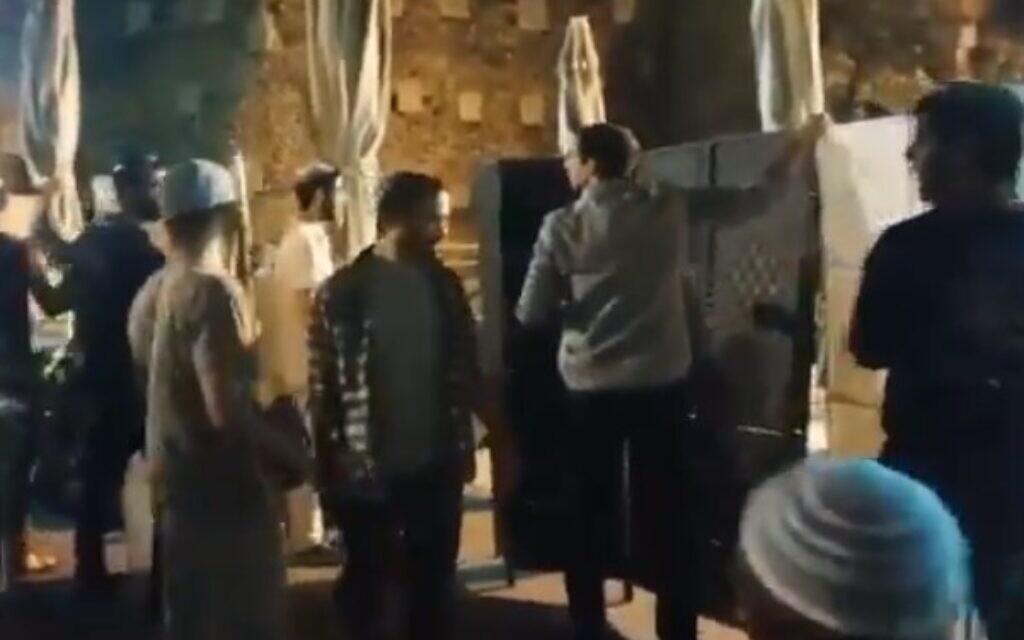
Speaking to The Times of Israel last month, the head of the group, Oren Henig, said that the protest at the egalitarian section last year was a “misstep” and said there were no plans to “fight with” progressive Jews at the site this year.
But while the Liba Center was responsible for last year’s altercation, it was not directly behind the June 30 protest. That was held by a largely uncoordinated group of teenagers and young men, and there’s no clear indication that they and others won’t return.
Far-right political parties, notably the Noam party, have also called for followers to hold a gender-segregated prayer at the egalitarian section in protest of the PMO’s mechitza ban directive.
In the face of this, the Masorti Movement in Israel — and affiliated groups — have called for supporters to fill the egalitarian section on Saturday night so no space will be left for protesters.
“This Tisha B’Av we are filling the family section of the Western Wall and disseminating unconditional love,” the movement said in a Facebook post.
As reported by The Times of Israel
